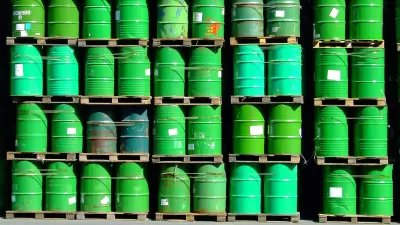A decision earlier this month by a group of the world's largest oil exporters to drastically reduce oil production to stem the decline in oil prices could be a ‘tipping point’ for a global recession, says the International Energy Agency.

“Saudi Arabia and Russia, acting as leaders of the OPEC Plus energy cartel, agreed on Wednesday to their first large production cut in more than two years in a bid to raise prices, countering efforts by the United States and Europe to choke off the enormous revenue that Moscow reaps from the sale of crude,” reported London-based Stanley Reed for The New York Times on October 5.
The cut of two million barrels a day represents about 2 percent of global oil production.
By reducing output, OPEC Plus was also seeking to make a statement to energy markets about the group’s cohesion during the Ukraine war and its willingness to act quickly to defend prices, analysts say.
OPEC Plus?
According to the BBC on October 5, the expanded energy cartel “is a group of 23 oil-exporting countries which meets regularly to decide how much crude oil to sell on the world market.”
At the core of this group are the 13 members of Opec (the Organisation of Oil Exporting Countries), which are mainly Middle Eastern and African countries. Opec was formed in 1960 as a cartel, with the aim of fixing the worldwide supply of oil and its price.
In 2016, when oil prices were particularly low, Opec joined forces with 10 other oil producers to create Opec+.
Nasdaq, the NY-based American stock market exchange, indicates on Aug. 3 that there are 11 other non-OPEC members in the cartel (making for a total of 24) and details the top 5 in terms of proven oil reserves, respectively: Russia, Kazakhstan, Azerbaijan, Mexico and Oman.
OPEC holds 80.4% of the world’s proven oil reserves, while the set of 11 non-OPEC nations represent 9.7% of proven oil reserves. With 90% of the world’s proven crude oil reserves held by these nations, they have the capability to disrupt or enhance the supply of crude oil.
“Together, these nations produce about 40% of all the world's crude oil,” adds the BBC.
“Opec+ tailors supply and demand to balance the market,” says Kate Dourian, of the Energy Institute. "They keep prices high by lowering supplies when the demand for oil slumps."
Global Recession?
Rachel Frazin, an energy and environment reporter for The HIll, reported on Oct. 13 (in the source article) on the warning issued by the Paris-based International Energy Agency (IEA), a group of 31 countries formed in 1974 in response to the 1973 oil embargo.
“The OPEC+ bloc’s plan to sharply curtail oil supplies to the market has derailed the growth trajectory of oil supply through the remainder of this year and next, with the resulting higher price levels exacerbating market volatility and heightening energy security concerns,” the organization said in its new oil market report.
“With unrelenting inflationary pressures and interest rate hikes taking their toll, higher oil prices may prove the tipping point for a global economy already on the brink of recession,” it continued.
The IEA oil report notes that the actual reduction in the oil output by the expanded cartel will be about half of what was announced on October 5.
The decline in OPEC+ supply will be smaller than the announced 2 mb/d reduction in production targets, with the majority of the alliance’s members already producing well below their ceilings due to capacity constraints. Our current estimate is for a decrease of around 1 mb/d in OPEC+ crude oil output from November, with the bulk of the cuts delivered by Saudi Arabia and the UAE.
Is It Working?
As for the effect on oil prices, the OPEC+ move does not appear to be working. “Crude oil prices continued their fall on Tuesday, with WTI [West Texas Intermediate] now dipping to levels not seen since before the OPEC+ meeting,” reports Julianne Geiger for Oilprice.com on Oct. 18.
The November contract for WTI crude fell to $83.22 per barrel on Tuesday afternoon—sliding 2.64% from Monday. The last time WTI was this low was days before OPEC+ met, when the group decided to cut 2 million barrels per day from its production targets starting in November.
Similarly, Tom Kool reports for Oilprice.com on Oct. 18 that the price of Brent crude has fallen “below $90 per barrel on global recession fears.” Far from causing a global recession, it would appear that the OPEC+ move was made in anticipation that the world is headed in that direction.
Hat tip to The Hill's Energy & Environment newsletter, October 13, 2022.
Related:
- Is $7 a Gallon for Gas on the Horizon? July 28, 2022
FULL STORY: OPEC+ cuts could be ‘tipping point’ for recession, global energy agency warns

Planetizen Federal Action Tracker
A weekly monitor of how Trump’s orders and actions are impacting planners and planning in America.

Restaurant Patios Were a Pandemic Win — Why Were They so Hard to Keep?
Social distancing requirements and changes in travel patterns prompted cities to pilot new uses for street and sidewalk space. Then it got complicated.

Map: Where Senate Republicans Want to Sell Your Public Lands
For public land advocates, the Senate Republicans’ proposal to sell millions of acres of public land in the West is “the biggest fight of their careers.”

Maui's Vacation Rental Debate Turns Ugly
Verbal attacks, misinformation campaigns and fistfights plague a high-stakes debate to convert thousands of vacation rentals into long-term housing.

San Francisco Suspends Traffic Calming Amidst Record Deaths
Citing “a challenging fiscal landscape,” the city will cease the program on the heels of 42 traffic deaths, including 24 pedestrians.

California Homeless Arrests, Citations Spike After Ruling
An investigation reveals that anti-homeless actions increased up to 500% after Grants Pass v. Johnson — even in cities claiming no policy change.
Urban Design for Planners 1: Software Tools
This six-course series explores essential urban design concepts using open source software and equips planners with the tools they need to participate fully in the urban design process.
Planning for Universal Design
Learn the tools for implementing Universal Design in planning regulations.
Heyer Gruel & Associates PA
JM Goldson LLC
Custer County Colorado
City of Camden Redevelopment Agency
City of Astoria
Transportation Research & Education Center (TREC) at Portland State University
Camden Redevelopment Agency
City of Claremont
Municipality of Princeton (NJ)





























